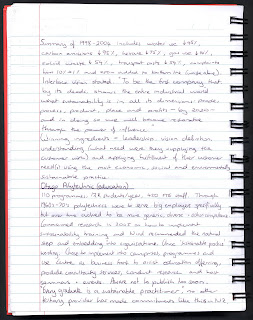Last night I attended the Hikurangi
Foundation’s first Open Space Forum ‘New Zealand & the Next Industrial Age’
with Rowan Douglas (
Willis Research Network) who gave a rough overview
of his impression of New Zealand and the Insurance Industries take on how we
have managed the Christchurch earthquake and what this new age of
extremes will be like to operate
in. By extremes he means the ever
increasing rate of natural disasters, economic instability, new technology,
etc.
He pointed out that our Institutions were
set up with the aim of achieving ‘efficiency’ but that the time has now come
where we need ‘resilience’ (a.k.a. sustainability). According to him, the Insurance Industry is in a state of rediscovery and has the challenge of learning about and deciding how to manage extremes, e.g. do we acquire the
funds to assist societies after extreme turmoil using local or international
schemes, and do they come from public or private sources?
Apparently, the Industry bases most of its
operational guidelines (e.g. how much money to have on standby) on scientific
data (good to hear!) acquired through computer modeling.
He didn’t spend too much time on this point, but went on to say that
the Industry is currently in restructuring mode and outlined all of the reasons
why New Zealand could be a model for the rest of the world in more ways than
one.
The Open Space Forum created 6 topics of
conversation and after we had 30 minutes to chat amongst ourselves the groups
shared a short summary. The topics were:
·
Building resilient (proactive)
communities: Main points were that we have to get more community
engagement. NZers lack knowledge of
their local assets and attributes, which is a scary thought. They also lack a conscience of how bad
overseas conditions are and we also lack it on regional matters because we read
the low-quality national news more than local newspapers.
·
The use of legislation for
resilience: Some have realized that
economic growth is not the same as wellbeing, but the conscious paradigm shift
needs to occur both for public and private sectors.
·
The role data could play in
communities and the ethics about its openness and source: organizations become
sustainable and resilient only slowly, so they need to be able to measure that
they are heading in the right direction along the way.
Seeing how data responds and organizes is very powerful and communities
should have this ability (e.g. Whistler does it!). At the moment government and business uses this
tactic, and all the data that’s collected is framed for their use only. Data and models are only useful when
they are applicable. Also, do we use their outputs to inform us or blindly? Quite quietly, one woman spoke and not many
picked up this gem: she said, ‘there is value in collecting data on peoples
values to inform us’ and it just made me think back to the my favourite concept
of ‘we should be voting on issues, not a popularity contest’ and the idea that
probably founded our current political system i.e. we do not need to vote on
issues if we know peoples values. I bet
there hasn’t been a hell of a lot of research (good and recent research I mean) into what
NZers values are. NZers are quite a
diverse bunch you know?! I must look
into this.
·
Effective
public-private-partnerships: We often
have public sector trying to do the private sector thing and failing but the
private sector probably has to have its paradigm shift first i.e. what’s the
purpose of business (hint: not just to make money like a greedy bugger anymore! Come
up with something better!)
·
The national security of New
Zealand and its clean green brand: this is the one I went to, and met a bunch
of really interesting people. The main points that really resonated with me
were: NZ’s long skinny shape needs to be considered for security and resilience
reasons. What industries do we need to
be self-sufficient and resilient? Would
we be better off investing in new spread out infrastructure than upgrading our
old one? It’s vital that our current
top-down heavy approach is matched with bottom-up approaches. A collective fund (such as the EQ levy) would
be helpful to finance after extreme events.
The one question we didn’t get to but I wanted to discuss was: What
needs to happen to speed up adoption of good ideas?
What I took from the evening was the
following:
·
Great conversations can happen
when you put people who are interested in the same things in a room and let
them choose which topics to discuss and contribute to.
·
A first glimpse into the
perspective that the Insurance Industry has in regards to the future and its
place in it.
·
Industries are all gagging to
have indicators or tools to measure progress.
I am quite sure that we can still do better to develop an applicable measuring tool for
how sustainable something is yet, and I’m keener than ever to dedicate some time into the
subject.


























